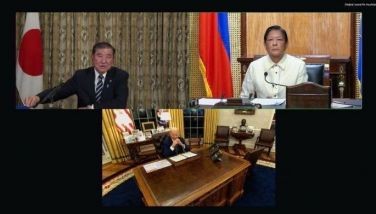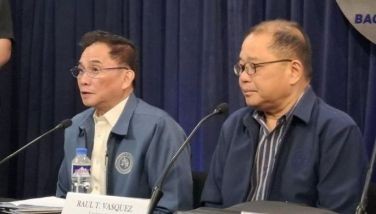Arroyo creates new task force to fight heinous crimes
September 29, 2005 | 12:00am
President Arroyo has created a new task force to fight heinous crimes and streamline all other groups formed to fight criminality.
Under Executive Order No. 463, the President formed the National Anti-Crime Task Force (NACTAF) under the Presidential Anti-Organized Crime Commission to enhance coordination between and among agencies engaged in the fight against criminality and improve the government’s effectiveness and efficiency in maintaining peace and order.
With the EO, the President effectively revived the National Anti-Kidnapping Task Force, though now it is expanded to cover other heinous crimes.
"There is an urgent need for a sustained, relentless and dedicated campaign to address heinous crimes in the country," the EO read.
"Numerous task forces have been created to deal with specific crimes and there is a need to streamline these task forces to rationalize resources and harmonize strategies that will intensify the fight against criminality," it added.
The EO states the NACTAF will have to conduct an assessment of anti-crime bodies created by executive issuances and recommend to the President their retention, abolition or reconstitution under the NACTAF.
Based on the EO, the NACTAF will be headed by the Department of the Interior and Local Government secretary, to be supported by a deputy and an executive director. It will be manned by a composite team from the law enforcement and related agencies, whose structure and staffing will be determined by the DILG, subject to the approval of the PAOCC.
The President pointed out that the EO should not be construed as a derogation of the Philippine National Police’s role as primary law enforcement agency of the country.
The NACTAF will direct the conduct of operations and cause the immediate arrest and investigation of crime suspects and their cohorts. — Aurea Calica
Under Executive Order No. 463, the President formed the National Anti-Crime Task Force (NACTAF) under the Presidential Anti-Organized Crime Commission to enhance coordination between and among agencies engaged in the fight against criminality and improve the government’s effectiveness and efficiency in maintaining peace and order.
With the EO, the President effectively revived the National Anti-Kidnapping Task Force, though now it is expanded to cover other heinous crimes.
"There is an urgent need for a sustained, relentless and dedicated campaign to address heinous crimes in the country," the EO read.
"Numerous task forces have been created to deal with specific crimes and there is a need to streamline these task forces to rationalize resources and harmonize strategies that will intensify the fight against criminality," it added.
The EO states the NACTAF will have to conduct an assessment of anti-crime bodies created by executive issuances and recommend to the President their retention, abolition or reconstitution under the NACTAF.
Based on the EO, the NACTAF will be headed by the Department of the Interior and Local Government secretary, to be supported by a deputy and an executive director. It will be manned by a composite team from the law enforcement and related agencies, whose structure and staffing will be determined by the DILG, subject to the approval of the PAOCC.
The President pointed out that the EO should not be construed as a derogation of the Philippine National Police’s role as primary law enforcement agency of the country.
The NACTAF will direct the conduct of operations and cause the immediate arrest and investigation of crime suspects and their cohorts. — Aurea Calica
BrandSpace Articles
<
>
- Latest
- Trending
Trending
Latest
Trending
Latest
Recommended
































